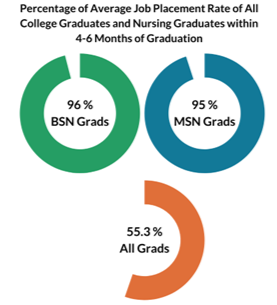2023 Employment Research Brief
Download PDF Version
In August 2023, AACN conducted its 14th online survey of nursing schools offering entry-level baccalaureate and master’s programs in the U.S. to better assess the experience of new graduates in finding employment. For the 13th consecutive year, AACN asked schools to identify if employers in their region were requiring or preferring that new Registered Nurse (RN) hires have at least a baccalaureate degree in nursing. A brief online survey was developed to solicit information from 810 deans of nursing schools offering baccalaureate and/or graduate programs. A total of 643 valid responses were received, generating a 79.4% response rate.
The Employment of New Nurse Graduates
Two questions were asked in the August survey about the employment of new graduates from entry-level baccalaureate and master’s programs:
- What percentage of 2022 graduates from your nursing programs had job offers at the time of graduation?
- What percentage of 2022 graduates from your nursing programs had job offers within 4-6 months after graduation?
Job Offers at Graduation
Of the 643 schools that responded to the survey, 548 (84.2%) reported having an entry-level baccalaureate program (BSN) and 94 (14.6%) had an entry-level master’s program (MSN) for which employment data for new graduates were available. The survey found that the average job offer rate at the time of graduation was 84% for new BSN graduates and 82% for entry-level MSN graduates.
Looking closer at the AACN data, the survey found little variation in the average rate of job offers at the time of graduation by institutional type (e.g., large vs. small school; public vs. private school; doctoral degree-granting vs. non-doctoral). However, there is some variability by region of the country. For new BSN graduates, the job offer rate for schools in the South and the Midwest is 90%, followed by 77% in the North Atlantic, and 72% in the West. These rates for entry-level MSN graduates are 85% in the South, 83% in the Midwest and North Atlantic, and 71% in the West. These findings indicate that employment of new graduates from entry-level nursing programs is more challenging in different regions of the country.
Job Placement 4-6 Months After Graduation
 With respect to job offers for new graduates 4–6 months after the completion of their programs, the survey found this rate to be 96% for entry-level BSN and 95% for MSN graduates. By comparison, the National Association of Colleges and Employers (NACE) conducted a national survey of nearly 509,000 new college graduates with baccalaureate degrees across disciplines in 2021 and found that 55.3% were employed full-time six months after graduation.
With respect to job offers for new graduates 4–6 months after the completion of their programs, the survey found this rate to be 96% for entry-level BSN and 95% for MSN graduates. By comparison, the National Association of Colleges and Employers (NACE) conducted a national survey of nearly 509,000 new college graduates with baccalaureate degrees across disciplines in 2021 and found that 55.3% were employed full-time six months after graduation.
Once again, the AACN survey found little variation based on school type and institutional characteristics. The job offer rate for BSN graduates by region all reached similarly high levels, from 98% in the South, 97% in the Midwest, 95% in the North Atlantic, and 91% in the West. For entry-level MSN program graduates, the job offer rate at 4-6 months post-graduation ranged from 96% in the South and Midwest, 93% in the North Atlantic, and 90% in the West.
Employer Preference for New Nurses with Baccalaureate-Level Preparation
Again this year, AACN asked nursing schools if employers in their region were requiring or indicating a preference for hiring new nurses with a bachelor’s degree in nursing. A significant body of research shows that nurses with baccalaureate-level preparation are linked to better patient outcomes, including lower mortality and failure-to-rescue rates. With the Institute of Medicine (2010) calling for 80% of the nursing workforce to hold at least a bachelor’s degree, moving to prepare nurses at this level has become a national priority.
Based on completed responses from 643 schools of nursing, 25.0% of hospitals and other healthcare settings are requiring new hires to have a bachelor’s degree in nursing, while 69.8% of employers are expressing a strong preference for BSN program graduates.
Clearly, healthcare settings nationwide are seeing a difference in nursing practice based on the level of education and are making hiring decisions to enhance the quality of care available to patients. For more background information on this issue, see AACN’s fact sheet on the Impact of Education on Nursing Practice. Complete survey information and data tables are available to AACN member schools and stakeholders by contacting Jenny Keyt, Associate Director, Institutional Data Services at 202-463-6930 or jkeyt@aacnnursing.org.
References
Institute of Medicine. (2010). The Future of Nursing: Leading Change, Advancing Health. Washington, DC: National Academies Press.
National Association of Colleges and Employers. (2022, October). First Destinations for the College Class of 2021: Findings and Analysis. Retrieved from https://www.naceweb.org/uploadedfiles/files/2022/publication/free-report/first-destinations-for-the-class-of-2021.pdf